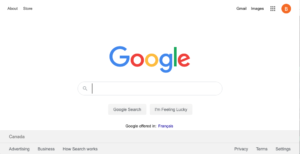What are Backlinks?
 Backlinks (also called inbound links) are links to your website from other people’s websites, and they highlight your website as a “go-to” place for search engines. A search engine will look at the number and dominance of organic links that lead to your site when assessing its quality for search engine result rankings (SERPs). They pretty much mark your website as a really popular kid in town who all the other popular kids want to befriend.
Backlinks (also called inbound links) are links to your website from other people’s websites, and they highlight your website as a “go-to” place for search engines. A search engine will look at the number and dominance of organic links that lead to your site when assessing its quality for search engine result rankings (SERPs). They pretty much mark your website as a really popular kid in town who all the other popular kids want to befriend.
Where Do Backlinks Come From?
Backlinks come from the 90s with the explosion of the internet. One of Google’s co-founders, Larry Page, created PageRank, an algorithm Google used to rank different sites depending on how many “votes” (internal links) a particular site had. If sites had content in common with other sites who linked back to them, they could rank higher on a SERP. Unfortunately, spammy people decided to gather as many links as possible to trick Google into ranking them higher instead of building their link inventory organically. Today, Google will actually penalize sites that are lazy in their link-building practices. More on that below.
Do I have to Bother with Them?
Yes, you do have to bother with them if you want your website/business to rank high with search engines like Google. (If you don’t want your website to rank high with Google, why on Earth are you reading this nerdy drivel?) Your backlinks must come from a trusted, relevant site from your industry. So if you are in the business of selling specialty moisture-wicking underwear to hot yoga enthusiasts, you might want to link to sites that sell sportswear, a yoga studio’s website, other niche underwear sites (trust me, there are a lot!) health and wellness sites/blogs, and the like. You would NOT likely want to link to a website for a monster truck rally or nudist colony because you need to consider your audience. Would the kinds of people who attend monster truck rallies and events at nudist colonies really be looking for moisture-wicking underwear? Do you think that the people who organize these events would be likely to link back to your site? If your answer is anything other than “absolutely!” then their site is not relevant to your industry, and you would not use their links on your site.
Backlinks are also critically important for Search Engine Optimization (SEO) because the more backlinks you have, the more search engines like Google will see them. Google sees backlinks like “votes” for your websites and will rank you better the more that you have. If you have a good website, the longer it has been around, the more backlinks you will have naturally accrued. Good backlinks will get Google’s attention. Use them. They will also increase your Domain Authority (DA), which is a useful way to compare your website’s performance to that of your competitors.
What are Bad Backlinks and How Do They Harm My Website’s SEO?
 Bad backlinks are backlinks from penalized websites, link farms, low-quality directories, or other sources that search engines identify as suspicious. Search engines give backlinks spam scores. A spam score of 5 is harmful 12% of the time. If the spam score increases to 7, it’s harmful 30% of the time. And a spam score of 11 will harm your website 90% of the time. These numbers might tempt you to remove all backlinks, but this would be a mistake (see above paragraph). You’ve earned your good backlinks, and you need them for SEO. Your task is to identify and keep good backlinks and remove/disavow bad backlinks, which is not as complicated as it sounds. And if you run into trouble Pathways Web Design is happy to help you navigate the process.
Bad backlinks are backlinks from penalized websites, link farms, low-quality directories, or other sources that search engines identify as suspicious. Search engines give backlinks spam scores. A spam score of 5 is harmful 12% of the time. If the spam score increases to 7, it’s harmful 30% of the time. And a spam score of 11 will harm your website 90% of the time. These numbers might tempt you to remove all backlinks, but this would be a mistake (see above paragraph). You’ve earned your good backlinks, and you need them for SEO. Your task is to identify and keep good backlinks and remove/disavow bad backlinks, which is not as complicated as it sounds. And if you run into trouble Pathways Web Design is happy to help you navigate the process.
Here are some factors that will (not surprisingly) increase your spam score:
 Poor external links
Poor external links- No contact information or links to social profiles
- Too many follow links compared to non-follow links
- Too few branded links
- Too much anchor text
- Backlinks with high spam scores
- Links purchased from a backlink generator or link exchange
- Links from an unrelated website or industry
- A link from a penalized website
Google associates your website with the websites linking to you. If they are penalized, or if the backlink is considered spammy, Google will impose a penalty on your rankings. You can expect bad backlinks if you:
- Got your links from poor-quality websites. Google judges your website by the company it keeps. If you’ve traded backlinks or added your site to a few free directories, you will end up with bad backlinks. To determine the quality of a website, search for their URL in Google with quotation marks around it e.g., “ford.com.” If their website ranks lower than #1 for their own URL, it probably has a penalty and should be embarrassed. It’s also worth your time to research directories to review their quality and usefulness and don’t subscribe to them unless you know they are legitimate. Finally, link to websites that are relevant to your industry. Remember the example of the underwear and the nudist colony? Consider your audience. Please.
- Used lazy SEO tactics. You can’t buy good backlinks any more than you can buy good friends. If you’ve subscribed to an SEO company that says it will add a few backlinks each month for a fee, they will harm your website’s rankings.
- Have old backlinks. You might have gotten a great backlink years ago from a website that was relevant to your industry but has since gone out of business. They’re no use to you if they are dead. Or worse, their expired domain may have been purchased and turned into a penalized website. As a result, you now have a bad backlink on your website.
- Have malicious competitors. They can buy bad backlinks to link to your website.
How Do I Figure Out Which Backlinks are Good and Bad?
You can use Google Analytics or Google’s Search Console to help you find the URLs or sites that are linking to your domain. From there, it’s a matter of determining which backlinks are improving your SERP ranking and which may need to be removed.
 Put all of your backlinks into a list.
Put all of your backlinks into a list.- Check to see if each website ranks #1 in Google for its own URL.
- If it doesn’t rank #1, get rid of it.
- If the URL ranks #1, go to the website to see if the content is relevant to your industry.
- If the content is relevant to your industry, and the website is high-quality, keep it.
- If the content looks like spam or generally useless, get rid of it.
If you identify any bad backlinks, you can get rid of them yourself or have a member of our team at Pathways Web Design perform a backlinks analysis and clean up any links that might be harming your site. We have people who enjoy that sort of thing.
How Do I Get Rid of Bad Backlinks?
First, contact the webmaster of the bad backlink and ask that they remove their link to your site. If they refuse or do not reply, you will need to disavow the bad backlinks. For more information on improving your website’s search engine rankings, or cleaning up your backlinks, get in touch at https://pathwayswebdesign.com/.

